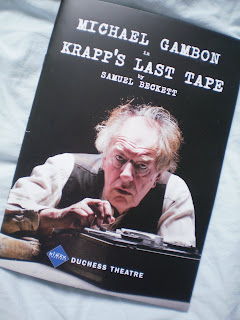On the Dark Side : The Tempest and As you Like It at The Old Vic
Two alternating Shakespeare plays, both directed by Sam Mendes at The Old Vic, brought out clear similarities of theme. Sadly, the productions emphasised darker aspects, at the expense of the lyrical and comic, to the detriment of both.
The Tempest is the more familiar to me. It's one of the 'late' plays, with a main character, the magician Prospero, apparently voicing Shakespeare's farewell to the theatre in his final speech beginning :
'This rough magic I here abjure...'
Prospero, a usurped and exiled Duke, has raised his daughter Miranda on a remote island with its own magical atmosphere. With his spirit helper Ariel he conjures up a tempest and a shipwreck. The courtly group of castaways includes Ferdinand, a suitable husband for Miranda. The island's other inhabitants are an old witch (not seen) and her misshapen offspring Caliban who is a double threat, both to Miranda's honour (he has tried to rape her in the past) and to Prospero's command. He tries to recruit two of the new castaways as support in plot to oust his master but is foiled partly through the intervention of Ariel, who hopes to be freed.

Much of the darkness derived from emphasising the colonial aspects -the enslavement of Caliban and Ariel. In addition, there's the sadness of the ageing tyrant who must concede place to the younger generation, and the presence among the group of his evil brother who has usurped his Dukedom , but there's also much light, and humour in Songs like 'Full Fathom Five' and the innocence that gives rise to Miranda's :
'O Brave New World, that has such people in it...'
as well as some of the descriptions of an isle 'full of music'
Shakespeare's crowd-pleaser
As You Like it was given something of the same treatment, with a Wintery rustic set that only turns Spring-like towards the end.
In this play, too, there's a Duke usurped and a brother Duke exiled, this time to the (probably mythical) Forest of Arden. Rosalind, the usurped Duke's daughter, wanders about disguised as a boy, accompanied by her friend Celia, and encounters Orlando, who fell in love with her and she him when she was in female dress at court. The plot is loose, but rustic lovers in the forest add to the comedy, songs lend an air of festivity and there are no fewer than four weddings at the end. The play also contains Shakespeare's famous 'seven ages of man' speech, beginning:
'All the world's a stage,
And all the men and women merely players'

The plays are two halves of a scheme called The Bridge Project, aimed at combining American and English actors and taking them on tour to Europe and Singapore. The final venue is The Old Vic, revamped under Kevin Spacey.
The plays were well-acted and directed, despite the overly-sombre presentation. The American actors seemed ill-at-ease with the lines,with the exception of Ron Cepas Jones, who played Caliban in
The Tempest and a minor role in
As You Like It. This arrangement worked well for other actors too, although Stephen Dillane made a better stab at the melancholy Jacques than the more magisterial presence required for Prospero.
Thomas Sodaski was excellent as Stephano the Drunken Butler and good as Touchstone. Christian Camargo was a plausibly lovestruck Orlando, but whey-faced and lacklustre as Ariel. Clear-voiced Juliet Rylance seemed a little old for Miranda, but was excellent in the much meatier role of Rosalind.


















































